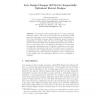Free Online Productivity Tools
i2Speak
i2Symbol
i2OCR
iTex2Img
iWeb2Print
iWeb2Shot
i2Type
iPdf2Split
iPdf2Merge
i2Bopomofo
i2Arabic
i2Style
i2Image
i2PDF
iLatex2Rtf
Sci2ools
94
Voted
FMCAD
2004
Springer
2004
Springer
Late Design Changes (ECOs) for Sequentially Optimized Esterel Designs
Late changes in silicon design (ECO) is a common although undesired practice. The need for ECO exists even in high-level design flows since bugs may occur in the specifications, in the compilation, or due to late specification changes. Esterel compilation deploys sequential optimization to improve delay and area of the netlist. This makes it harder to find in the netlist where manual changes should be done and to trace circuit changes back to the high-level specification. We show that all sequential optimizations used in Esterel compilation can be made reversible and demonstrate that an ECO problem can be reduced to a commonly solved combinational ECO problem. This is achieved by reconstructing some of the suppressed registers in order to backannotate to the original code. We demonstrate that the cost of reversibility is negligible.
| Added | 01 Jul 2010 |
| Updated | 01 Jul 2010 |
| Type | Conference |
| Year | 2004 |
| Where | FMCAD |
| Authors | Laurent Arditi, Gérard Berry, Michael Kishinevsky |
Comments (0)

